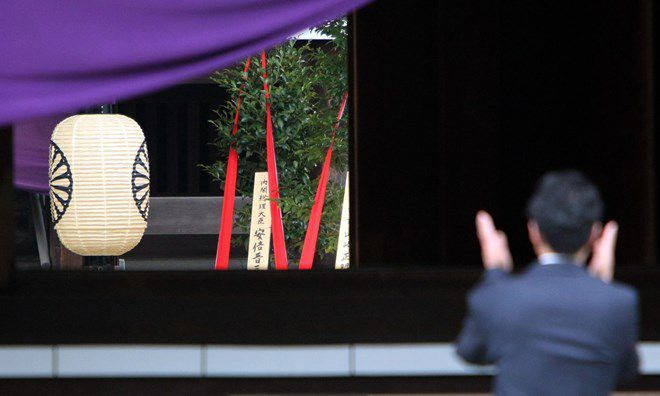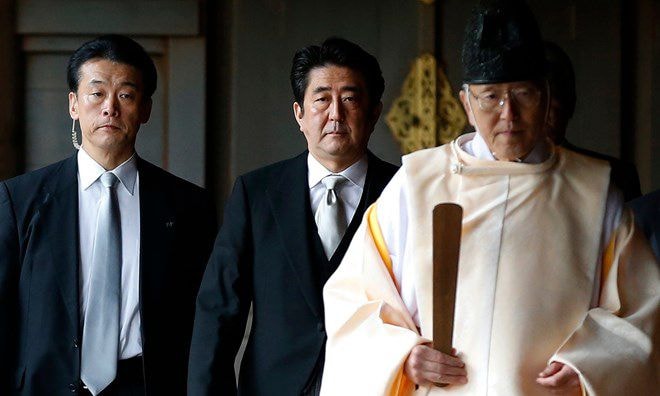Prime Minister Shinzo Abe: Japan's apology is enough!
Japanese Prime Minister Shinzo Abe has hinted that he will not apologize for Japan's wartime actions during commemorations marking the end of World War II.
Mr Abe's announcement came just hours before he sent a symbolic offering to the Yasukuni Shrine, which honors 2.4 million Japanese soldiers, including war criminals, who died in the war.
This statement by Mr. Abe is likely to anger China, South Korea and North Korea.
 |
| A Japanese man clasps his hands in front of the Yasukuni Shrine. |
However, the Japanese Prime Minister did not personally visit this shrine. By only making offerings, Mr. Abe hoped to avoid criticism from the international community before his visit to Indonesia and the United States.
There has been speculation that the speech marking the 70th anniversary of the end of World War II will not contain an apology and will downplay Japan's responsibility for its "invasion and colonization" of Asia in the first half of the 20th century.
Both details are a departure from past speeches by Mr. Abe's predecessors to mark the 50th and 60th anniversaries of World War II, which ended with Japan's defeat.
In an interview on the evening of April 20, Mr. Abe indicated that he would not apologize directly to Japan’s former victims. “I agree with what was said in the previous apologies, which means it would not be necessary to repeat them,” he told Fuji TV.
By dropping the apology and downplaying Japan’s wartime actions, Mr. Abe risks drawing opposition from China and South Korea as he tries to arrange a summit with them.
He is expected to speak about his stance on wartime Japan at an Asian-African conference in Jakarta on April 22 and may meet Chinese President Xi Jinping on the sidelines.
 |
| Prime Minister Shinzo Abe at the Yasukuni Shrine in 2013. |
The two countries' top leaders met last November, marking their first formal meeting since 2012, on the sidelines of an APEC meeting in Beijing, but Mr. Abe has yet to hold bilateral talks with South Korean Prime Minister Park Geun-hye.
Mr Abe will then visit the US, where he will become the first Japanese prime minister to address a meeting of the US Congress.
“The success or failure of this visit depends on whether Mr. Abe can honestly confront Japan’s history, including the decision to start the war, the invasion of China and Korea, war crimes and the forced sexual slavery of thousands of women in wartime brothels,” the New York Times commented.
Beijing and Seoul have asked Mr Abe to respect a statement made in 1995 by former Prime Minister Tomiichi Murayama, apologizing for Japan's actions.
At the time, Mr. Murayama said, “Japan, through its colonial activities, caused great harm and suffering to the people of many countries, particularly Asian countries.” Ten years later, former Prime Minister Junichiro Koizumi made similar remarks.
Although Japan and China are showing signs of easing tensions, Mr. Abe's comments may suggest that he is likely trying to downplay the events that took place during the darkest moment in Japan's history and could change the relationship between the two countries.
According to Infonet
